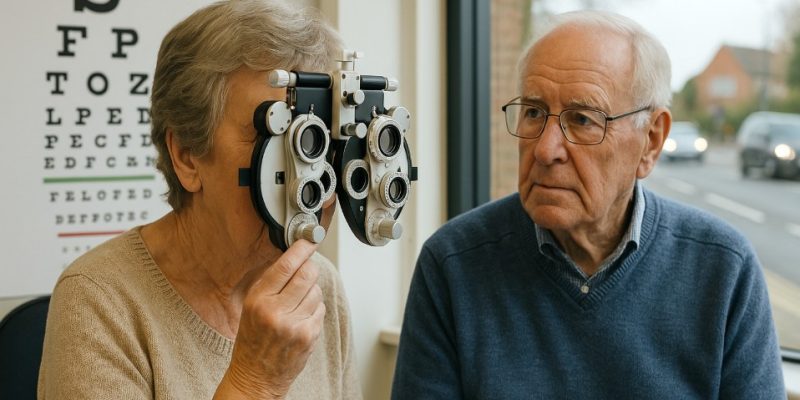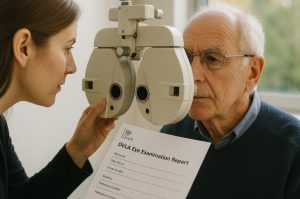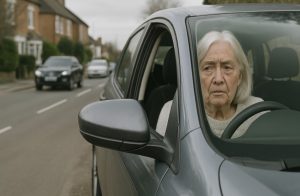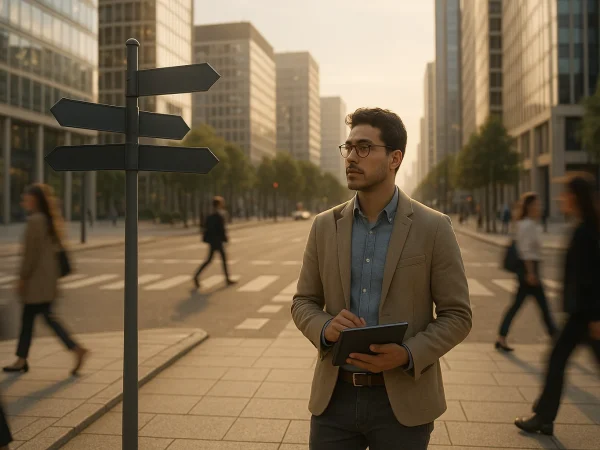
Over 70s Driving Eye Test – The New Law Impacting Senior Drivers
The UK government is preparing to introduce significant changes to road safety laws, including a compulsory eyesight test for motorists aged over 70.
This move comes in response to growing concerns over the risks posed by drivers with failing vision, highlighted by several fatal incidents in recent years.
The proposed law would require older drivers to prove their eyesight meets legal standards when renewing their licence every three years, replacing the current self-declaration system.
Why Is the UK Introducing Compulsory Eye Tests for Drivers Over 70?

The proposal for mandatory eyesight testing for older drivers is driven by a combination of safety statistics, public pressure, and legal recommendations from coroners.
While the policy specifically targets motorists over the age of 70, it forms part of a wider road safety initiative aimed at reducing accidents and fatalities.
Concerns Over Self-Reporting Vision Standards
Currently, the UK is one of only three European countries that allows drivers to self-report their eyesight fitness when renewing their licence. This means:
- Drivers are not required to show proof of a recent eye examination.
- Medical conditions affecting vision may go unreported.
- There is no independent check to ensure drivers meet legal standards.
This system has been criticised for relying too much on personal honesty and awareness, which can be unreliable, especially when age-related decline is gradual and unnoticed.
Fatal Accidents Linked to Poor Eyesight
Calls for reform intensified after the inquest into four separate road deaths, each caused by drivers with deteriorating vision.
The victims aged between 75 and 85 died in collisions where the drivers’ inability to see hazards was a key factor.
The coroner, Dr James Adeley, described the current licensing system as:
- Ineffective at preventing unsafe drivers from remaining on the road.
- Unsafe for other road users.
- Unfit to meet the needs of a growing elderly population.
These findings placed significant pressure on the government to act quickly.
The Scale of the Road Safety Problem
Government and charity statistics reinforce the urgency:
- Around 1,600 people die on UK roads each year.
- Thousands more suffer life-changing injuries.
- Poor eyesight is a hidden contributor to accidents, often underreported in official data.
- The NHS spends over £2 billion annually treating road accident injuries.
While younger drivers are more likely to take risks and be involved in high-speed crashes, older drivers are disproportionately affected by vision-related collisions, particularly at junctions or in poor light.
Support From Road Safety Organisations
Road safety groups, including Brake and the Older Drivers Forum, support the move towards compulsory vision testing. They argue that:
- Eye tests are quick, affordable, and non-invasive.
- Regular checks can identify treatable conditions like cataracts before they cause accidents.
- The measure will bring the UK in line with European best practice.
Some organisations also point out that introducing the tests at 70 is a balanced approach, targeting the age where vision decline becomes more common without placing unnecessary burdens on younger drivers.
What Are the Current Driving Licence Renewal Rules for Over 70s?
Currently, drivers aged over 70 must renew their licence every three years. The process is straightforward and can be completed online or by post, but it has several weaknesses.
Key features of the existing system include:
- Renewal is based on a self-declaration of fitness to drive.
- There is no requirement to present proof of having passed an eyesight test.
- Short-sightedness, long-sightedness, and colour blindness are excluded from reporting requirements.
- Conditions like glaucoma, double vision, or certain degenerative eye diseases must be declared.
While this approach reduces bureaucracy, it relies heavily on personal judgement and honesty. This means some drivers may continue driving even if their eyesight falls below the legal standard.
Table 1: Current Renewal Process for Over 70s
| Step | Requirement | Proof Needed |
| Licence Renewal | Every 3 years | Yes (renewal form and ID) |
| Medical Self-Declaration | Must declare relevant conditions | No proof required |
| Eyesight Check | Self-assessed by driver | No proof required |
How Will the New Eye Test Requirements Work for Senior Drivers?

The proposed law will replace the current self-declaration system with a mandatory vision check for drivers aged over 70.
This would ensure that every driver in this age group can provide proof that their eyesight meets legal safety standards before their licence is renewed.
The Licence Renewal Process Under the New Rules
At present, drivers over 70 can renew their licence online or by post every three years without any medical evidence. Under the new proposal, the process would change to include:
- Booking an appointment with an approved optician or vision testing centre.
- Completing a vision test that checks for distance clarity, peripheral awareness, and possibly glare sensitivity.
- Obtaining a certificate confirming that the driver meets DVLA eyesight standards.
- Submitting the certificate alongside the renewal form to complete the process.
This new system introduces an official check that cannot be bypassed or skipped through self-assessment.
What the Eye Test Is Likely to Include?
While the exact testing method has yet to be finalised, it is expected to assess:
- Visual acuity the ability to read a number plate from 20 metres.
- Peripheral vision ensuring awareness of hazards approaching from the sides.
- Contrast sensitivity the ability to see in low-light or foggy conditions.
- Glare recovery reaction to bright lights such as oncoming headlights.
These are all areas of vision that can decline with age, even without the driver being fully aware of the changes.
Addressing Appointment Availability Concerns
One of the main challenges raised during early discussions is the potential difficulty for some older drivers in securing timely appointments, particularly through NHS optometry services.
- In rural areas, there may be fewer approved providers.
- Delays could cause drivers to miss their renewal deadline, leading to temporary loss of their licence.
- Private optician appointments may be available sooner but could add extra cost.
The government may need to ensure that sufficient approved testing centres are available before implementing the law to avoid penalising drivers who are willing but unable to comply.
Potential Benefits of the New System
Proponents of the change point to several benefits:
- Early detection of eye conditions such as glaucoma, cataracts, or age-related macular degeneration.
- Increased public safety by ensuring all drivers on the road meet the minimum legal vision standard.
- Peace of mind for families concerned about an older relative’s driving safety.
- Alignment with European standards, making the UK’s system more consistent internationally.
For many road safety experts, the test is considered a minor inconvenience compared to the potential for preventing fatal accidents.
What Other Road Safety Changes Are Being Considered?
The compulsory eye test proposal is part of a wider road safety package being prepared by the government. Ministers believe a multi-pronged approach will be more effective than focusing on one factor alone.
Proposals include:
- Reducing the drink-driving limit in England and Wales from 35 micrograms per 100ml of breath to 22 micrograms matching Scotland’s limit introduced in 2014.
- Considering compulsory medical checks for conditions such as dementia, which can impair judgement and reaction times.
- Allowing police to use roadside saliva tests as admissible evidence in drug-driving cases, bypassing the need for more time-consuming blood tests.
- Issuing penalty points for failing to wear a seatbelt, making this offence carry the same weight as other safety breaches.
Table 2: Summary of Proposed Road Safety Measures
| Measure | Current Status | Proposed Change |
| Eye Tests for Over 70s | Self-declared vision standard | Proof of passing an official test |
| Drink-Driving Limit | 35 micrograms/100ml | 22 micrograms/100ml |
| Dementia Testing | Not required | Under review |
| Drug-Driving Evidence | Blood test required | Saliva test accepted |
| Seatbelt Offences | Fine only | Fine + penalty points |
Will These Changes Unfairly Target Older Motorists?

The debate over compulsory eye tests for older drivers has highlighted differing views on road safety policy.
Some critics argue that targeting a specific age group risks unfairly stereotyping older motorists, many of whom have spotless driving records and maintain good health well into their eighties.
However, supporters stress that the policy is about safety, not age discrimination. Data shows that:
- Older drivers are generally safer in terms of speeding and risk-taking behaviour.
- Certain accident patterns, such as junction collisions and failure to notice hazards, occur more often among drivers with declining eyesight.
- The highest accident rates are among younger drivers, but vision-related crashes tend to involve older motorists.
The aim is to address the specific risks associated with vision decline, which becomes more common with age, without unnecessarily removing competent drivers from the roads.
How Does the UK Compare to Other European Countries on Eye Test Laws?
In comparison to many European countries, the UK has relatively relaxed requirements for driver vision checks.
In nations such as Spain, Italy, and France, vision proof is mandatory at various stages of a driver’s licensing life, not just at the age of 70.
Examples from Europe:
- France: Medical certification, including vision checks, is required for licence renewal.
- Spain: Regular medical and vision checks are mandatory for all drivers, with shorter intervals for older age groups.
- Netherlands: A combined medical and vision assessment is carried out for older drivers and certain professional licence holders.
This international comparison suggests that compulsory eyesight checks for senior drivers are not unusual rather, the UK’s current self-reporting system is the exception.
What Steps Can Over 70s Take Now to Prepare for the New Law?

Even before the new eyesight testing rules are introduced, there are practical measures drivers over 70 can take to ensure they remain safe, compliant, and confident behind the wheel. Preparing early can prevent last-minute stress when the law comes into effect.
Scheduling Regular Eye Examinations
One of the most effective ways to prepare is by maintaining a consistent schedule of eye tests.
- Opticians generally recommend a full eye examination every two years.
- Drivers with existing eye conditions, such as glaucoma or cataracts, should consider annual checks.
- Keeping a record of test results can help track changes over time and provide proof of fitness to drive if needed.
This habit also ensures that any developing vision problems are addressed before they affect driving ability.
Understanding the DVLA’s Vision Standards
Drivers should familiarise themselves with the current legal eyesight requirements for driving:
- Ability to read a number plate from 20 metres away in good daylight.
- A visual acuity of at least 6/12 on the Snellen scale (with glasses or contact lenses if needed).
- Adequate field of vision without significant blind spots.
Knowing these standards in advance can help older drivers assess whether their eyesight is likely to meet future test requirements.
Taking Preventative Measures for Eye Health
Maintaining good vision is not just about passing a test it’s about protecting eye health long term. Simple lifestyle adjustments can make a difference:
- Wearing sunglasses to reduce glare and UV damage.
- Eating a diet rich in vitamins A, C, and E to support eye health.
- Managing conditions like diabetes or high blood pressure, which can affect vision.
These measures can help preserve eyesight well into later years.
Keeping DVLA Records Up to Date
The DVLA requires drivers to report certain medical conditions that may affect their ability to drive. Being proactive in updating records can prevent legal issues:
- Notify the DVLA of diagnosed eye diseases promptly.
- Ensure address and contact details are current to avoid missing renewal reminders.
- Keep copies of optician reports or medical letters in case proof is needed.
This also builds a clear history of responsible driving behaviour.
Practising Safe Driving Habits
While preparing for a legal requirement, drivers can also adopt safer driving strategies:
- Avoid driving at night if glare from headlights causes discomfort.
- Limit driving in bad weather or low-visibility conditions.
- Take regular breaks on long journeys to prevent fatigue and maintain alertness.
These habits can improve both safety and confidence on the road.
Conclusion
The proposed compulsory eyesight test for drivers over 70 marks a significant shift in UK road safety policy.
While some have voiced concerns about fairness and practicality, the aim is to protect all road users by ensuring that those behind the wheel can see clearly and react appropriately to hazards.
Alongside other measures such as a lower drink-driving limit, the law represents a wider commitment to reducing road deaths and serious injuries.
FAQs
How often will over 70s need to take the new eye test?
The proposed requirement would apply every three years, coinciding with licence renewal.
What happens if an over 70 fails the driving eye test?
If a driver fails, they would not be able to renew their licence until vision meets the legal standard, potentially after treatment or corrective measures.
Can an optician’s report be used for the DVLA eyesight requirement?
Yes, if the optician is approved and the report confirms the driver meets the necessary standards.
Will the new eye test be free for senior drivers?
Currently, most eye tests must be paid for privately, though some individuals may qualify for NHS-funded tests.
Do these rules apply in Scotland and Northern Ireland?
Scotland and Northern Ireland have separate systems; the proposals currently apply to England and Wales, though similar changes could follow.
Are there exemptions for rural drivers over 70?
No exemptions are planned, as the law aims to ensure consistent safety standards nationwide.
Could compulsory eyesight testing be expanded to younger drivers?
It is possible that similar testing could be introduced for all drivers in the future, though there are no confirmed plans at present.





